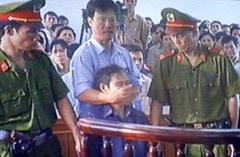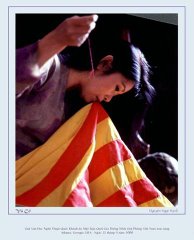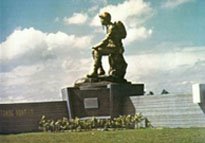
Oxford Analytica 06.21.07
Vietnamese President Nguyen Minh Triet's arrival yesterday in the United States marked the first visit by a Vietnamese head of state since 1975. Following the Vietnamese leader's tour through Los Angeles, New York and Washington, President George W. Bush will host Triet on June 22 for wide-ranging strategic and economic talks at the White House. However, administration officials recently downgraded aspects of the summit, due to renewed concerns over Hanoi's human rights record.
Bush visited Hanoi in November 2006. Washington did not formally invite Triet until early June. The delay was a calculated rebuke to Hanoi for the arrests and trials since March of seven dissident advocates of multi-party politics. Following Vietnam's successful entry into the WTO, the government has been less willing to defer to Western human rights concerns.
Washington and the European Union joined international human rights groups in sharply criticizing Hanoi this spring. This month, Bush hosted Vietnamese-American democracy activists at a highly unusual White House meeting to signal his displeasure. Representative Earl Blumenauer of Oregon, the Democratic co-chair of the U.S.-Vietnam Caucus in the House of Representatives, resigned his caucus position and threw his support behind a resolution criticizing Vietnam's human rights practices.
To ease Western pressure and enable Triet's visit to go forward, Hanoi has released a handful of dissidents over the past two weeks. They include Le Quo Quan, arrested in March after returning from a brief academic fellowship in the United States, and Nguyen Vu Binh, a journalist. These gestures only partly mollified Washington. The Bush administration has refused to give Triet a state dinner and has shifted the signing ceremony for a key trade agreement from the White House to a lunch hosted by the U.S. Chamber of Commerce. Bush has said publicly that he will discuss human rights issues with Triet during the June 22 White House meeting.
Triet and his delegation will likely encounter vocal, if polite, criticism when the congressional leadership greets them. House Speaker Nancy Pelosi, R-Calif., and Senate Minority Leader Mitch McConnell, R-Ky., are both strong human rights advocates. Security for Triet's visit is also exceptionally tight because of anticipated protests by Vietnamese-American groups in both Washington and Los Angeles.
Trade relations are rapidly expanding between Washington and Hanoi. U.S.-Vietnam trade has more than quadrupled (to $9.7 billion per year in goods and services) since a bilateral trade agreement went into effect in 2001. To facilitate this trend, the two countries will sign a Trade and Investment Agreement (TIFA) on June 21, at the U.S. Chamber of Commerce. The agreement represents a critical step toward negotiation of a U.S.-Vietnam free trade agreement.
The Triet delegation is also expected to confirm a number of lucrative business deals with U.S. firms. These include joint ventures between Chevron and Vietnam Petrochemical and between Microsoft and the Vietnamese Bank of Agriculture. The U.S. and Vietnamese Chambers of Commerce will also announce the establishment of formal ties. Lastly, Boeing hopes to conclude negotiations on another substantial aircraft order by Vietnam Airlines, even if a formal announcement does not occur during Triet's stay.
Triet's visit will further strengthen U.S.-Vietnamese ties, which have been driven forward by expanding bilateral trade and similar strategic concerns in Southeast Asia. While Congress and the Bush administration will continue to criticize Vietnam's human rights record, this is highly unlikely to result in curbs on trade.






No comments:
Post a Comment